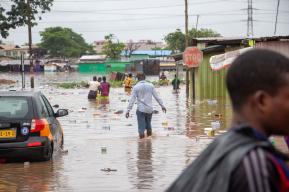

UNESCO Designated Sites: A Climate Change Observatory
The iconic UNESCO-designated World Heritage sites, Biosphere Reserves and UNESCO Global Geoparks provide useful platforms to apply and test climate monitoring, mitigation and adaptation, and to raise awareness on climate change impacts on human societies, cultural diversity, biodiversity, ecosystem services, and the world’s natural and cultural heritage. Spread across different regions, climates and ecosystems around the world, climate change is already being felt in many UNESCO-designated sites. Communities there are working on innovative ways to address climate change.
Besides its impacts on biodiversity and natural heritage, climate change also affects the world’s cultural heritage, eroding archaeological remains and historical buildings both on land and underwater.
Climate change can cause other social and cultural impacts – communities are changing the way they live, work, worship and socialize in buildings, sites and landscapes. They could also migrate, abandoning their built heritage and losing their intangible cultural heritage.
As climate change observatories, many UNESCO-designated sites also contribute to mitigation solutions including by promoting green economies.

The iconic value of these sites means they also serve as a useful platform to share information on applied and tested monitoring, mitigation and adaptation processes, and to raise awareness on the impacts of climate change on human societies and cultural diversity, biodiversity and ecosystem services, and the world’s natural and cultural heritage. UNESCO supports its Member States in these efforts, including in building the capacity to design sustainable development options, responding to the new kinds of conservation challenge posed by climate change, developing innovative policy, tailoring management strategies, and recognizing the value of resilient protected area systems that help safeguard the global environment and human societies from the threats posed by climate change.
Initiatives

Enhance natural and cultural resources and improve local communities' resilience in the Lake Chad basin


Mangrove restoration as a nature-based solution in biosphere reserves in Latin America and the Caribbean




in Yangambi Biosphere Reserve, Democratic Republic of Congo
Publications


Joining efforts for the sustainable management of coastal zones and islands on the South Pacific coast of Latin America

n°100 - October 2021








